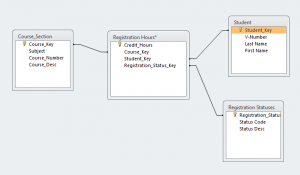- The warehouse design is based on Ralf Kimball’s data model
- The Kimball model includes both dimensions and facts
- The model revolves around numbers (facts)
- The dimensions describe the facts
- A dimensional model is optimized for reporting (queries)
- The warehouse is a “snapshot in time” of Banner data and other non-Banner data sources
- example: 4th week data
- Cognos is the reporting tool that is used to pull the data from the warehouse
- Converted as PDF and printed
- Saved as Excel file
- e-mailed to your inbox
- Facts (also referred to as cubes):
- contains the data corresponding to a particular business process, action or event; typically numeric (links two or more dimensions together)
- example of a fact: registration(credit hours, grades, quality points)
- Dimensions:
- contains details about each instance of an fact (descriptors)
- examples of dimensions: academic year, academic period, entity(last name, first name), section(course title, course number, crn, section term code)
- The Data Warehouse was placed into production on June 2, 2014.
- The warehouse includes 108,702,145 rows of data from Banner Finance, Student and Human Resources and Financial Aid
- Reporting includes pre-built and ad-hoc queries.
- Pre built reports will include parameters that you will respond to at run time
- Ad-hoc queries will give you the ability to have full control of the report
- The data is refreshed on a nightly basis.
- # of Dimensions ………………………….72
- # of Cubes ………………………………….56
- # of data elements (columns) …..2,666
Demonstration:
- Ad-hoc reporting — credit hours
- Grade crosstab rollup
For access to the data warehouse, contact Faye Whitenack at whitenaf@wou.edu.
For Cognos Warehouse training, contact Max Chartier at chartierm@wou.edu


